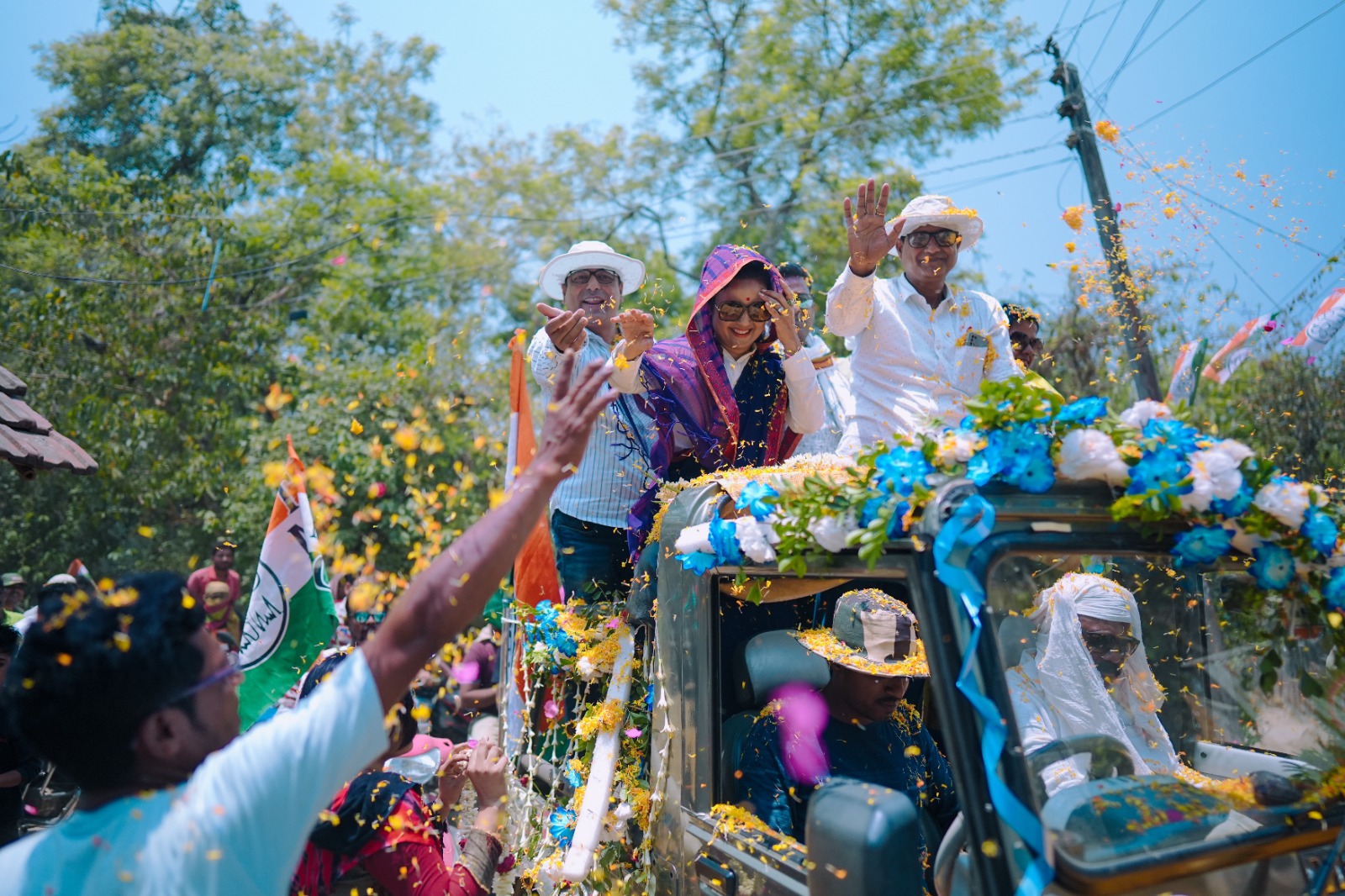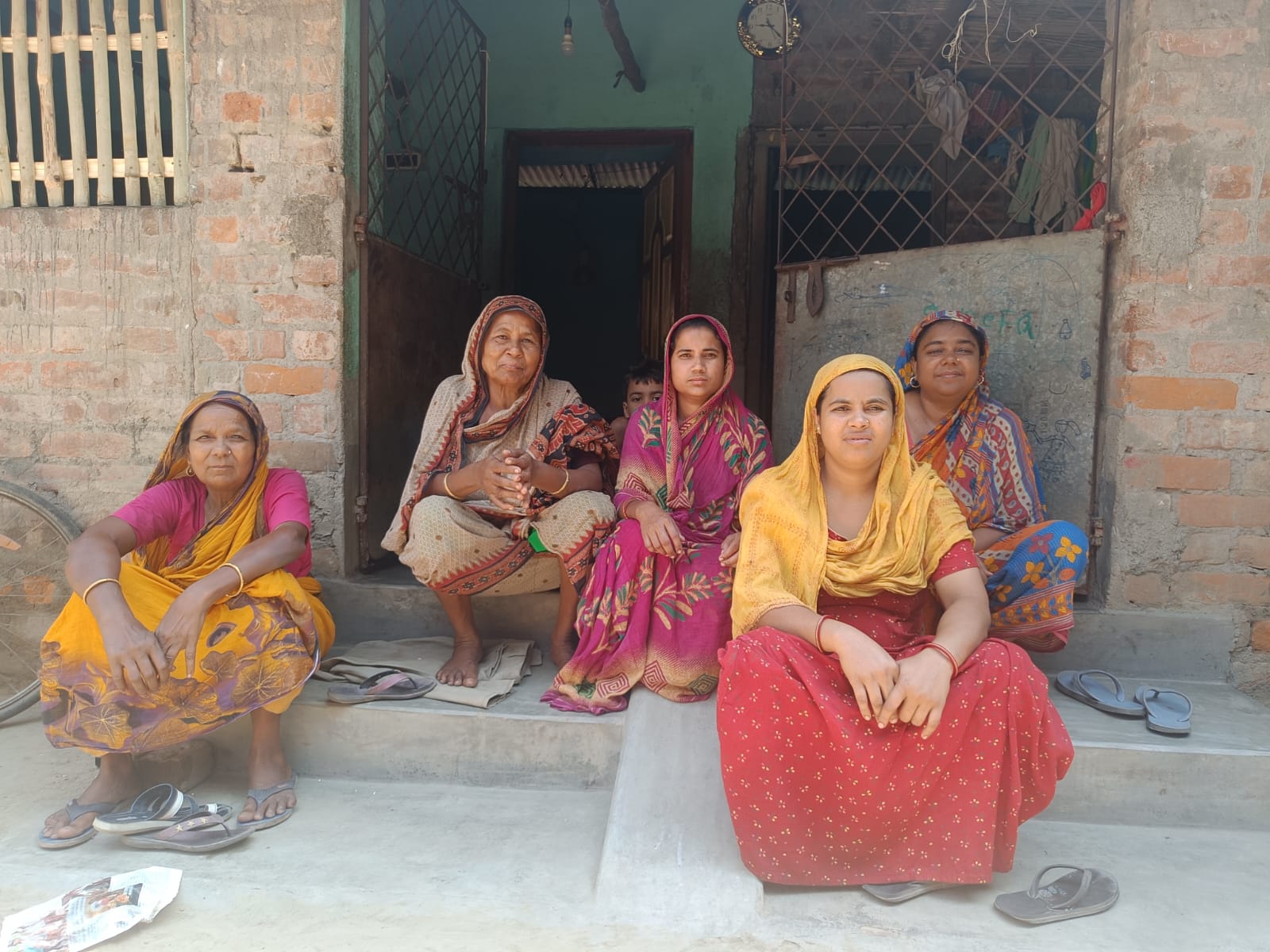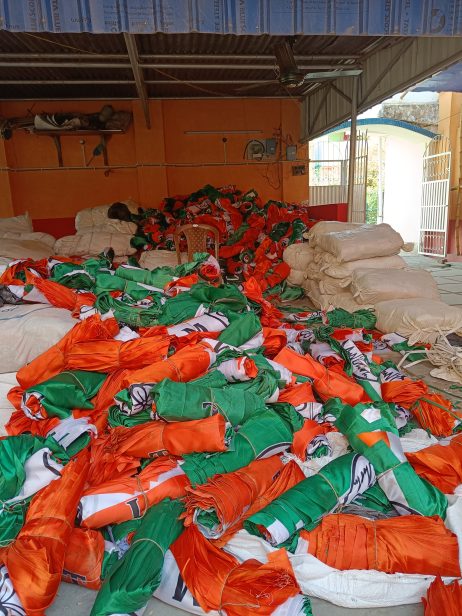Three hours away from the eastern Indian metropolis of Kolkata lies Krishnanagar, a predominantly rural constituency that is going to the polls on May 13 in the ongoing Indian general elections. This far-flung constituency, which shares a border with Bangladesh, has been described as the site of “Bengal’s most high-voltage Lok Sabha battle ground,” with suspended parliamentarian Mahua Moitra seeking re-election in the constituency.
Moitra, 49, is one of the sharpest and most outspoken critics of Prime Minister Narendra Modi. A member of the opposition Trinamool Congress (TMC) party, she was suspended from the Lok Sabha, the lower house of India’s Parliament, last December on corruption charges. It is believed that it was her repeated attacks on Modi and the Bharatiya Janata Party (BJP) government’s proximity to industrialist Gautam Adani that cost Moitra her states as an MP.
The opposition INDIA coalition has declared the 2024 elections as a decisive fight to save India’s Constitution and democracy. Moitra, a Wall Street investment banker turned politician, is unafraid and undeterred.

Mahua Moitra is showered with flower petals during election campaigning. Photo courtesy of Moitra’s campaign team.
On Moitra’s campaign trail in Krishnanagar, the local TMC party worker on a megaphone exhorts the electorate reminding them, “Mahua Moitra, Dillir Parliament kapano, masnad kapano” (“Mahua Moitra is the one who shook up the Parliament, she shook up the corridors of power in Delhi”).
It is yet another day of campaigning for Moitra, under a scorching summer sun during one of the worst heatwaves the state has witnessed in recent times. The only concession she makes is the long sleeved white tunic she sports with her crisp cotton sari. Moitra is, as she often says quite proudly, a good brand ambassador of the colorful light cotton saris made by the famed local weavers in Fulia and Shantipur. She stands atop an open jeep, despite the merciless sun and 42-degree Celsius temperature, interacting with the public for the next few hours. She waves, smiles, accepts marigold garlands, and accedes to requests for selfies.
Moitra has a palpable connection with her constituents. She makes it a point to directly speak to the women and inquire whether they are having any problems accessing state government schemes like Lakshmir Bhandar, a popular women empowerment scheme that gives a monthly cash allowance to women above the age of 25. Through the 70-day long campaign, Moitra has done over 70 such roadshows, without a break. She is a familiar face in these parts having already served one five-year term as their MP.

Mahua Moitra interacting with women during a campaign event. Photo courtesy of Moitra’s campaign team.
Her expulsion from Parliament just four months before the general elections, the opposition claimed, was the culmination of a well-orchestrated witch hunt. “There are two unwritten rules in the BJP,” Moitra says. “You can’t speak against the prime minister and you can’t speak against his best friend, Mr. Adani. And I did both, so obviously I am public enemy number one.”
It was alleged that Moitra took cash in return for asking questions in Parliament on behalf of an industrial house – charges that have never been proven. She was also accused of sharing her Parliament login with a third party. Moitra has denied any wrongdoing, alleging that the office staff of most MPs accessed their logins.
Moitra was hauled before a Parliamentary Ethics committee in an opaque investigation and then suspended as MP. The BJP government enjoys an absolute majority in Parliament with 303 out of 543 seats.
Moitra is unfazed by the attempts to silence her. “It hasn’t got them [the BJP] what they wanted,” she says with a smile.
Within days of her ouster, Moitra was served an eviction notice from her official residence in New Delhi. She was summoned for questioning by central agencies like the Enforcement Directorate and the Central Bureau of Investigation (CBI). The CBI subsequently raided her Karimpur home as well as her parents’ residence in Kolkata. Moitra said that the bureau did everything to harass and intimidate her, but said that “whatever doesn’t break you, makes you strong. I think it’s a very important rite of passage in my political life.”
When the BJP used its majority to expel Moitra by a voice vote, INDIA alliance parties supported her. Senior leaders including former Congress President Sonia Gandhi walked out of Parliament in protest. Despite Moitra being a first time parliamentarian, she gained unprecedented traction for what she describes as an “egregious expulsion.”
The strongest endorsement came from her party chief, West Bengal Chief Minister Mamata Banerjee, the country’s only woman chief minister, who described Moitra as a “brave tiger cub.” Banerjee then chose to launch the party’s 2024 election campaign from Moitra’s constituency, Krishnanagar, signalling a direct challenge to Narendra Modi and the BJP.

A Mahua Moitra poster at the Krishnanagar Railway station. Photo by Kavita Chowdhury.
The BJP came a close second to the ruling Trinamool Congress in West Bengal’s at the 2019 election, winning 18 seats to the TMC’s 23. This time, the BJP is desperate to win the state. Modi is addressing more than 30 public rallies in West Bengal and has already addressed two in Krishnanagar alone. News reports suggest that the state is a prestige fight for the BJP.
The BJP candidate here is a member of the erstwhile local royal family, Amrita Roy, who was inducted into the BJP only in March. Not many know her since she is not a local resident.
Moitra isn’t worried about her rival contender. She says, “For the BJP the candidate is irrelevant, as they themselves say, its Prime Minister Modi fighting all 42 seats [in West Bengal]. So who the candidate here is, is irrelevant. But we are in a fight against the fascist forces of the BJP.”
Moitra states that what is under threat is “the idea of India.” She adds, “There is a lot at stake. A democratically elected prime minister of a secular country every day spews venom against 200 million of its citizens [Muslim minorities] whom he sees as enemies; all our institutions are compromised.”
The firebrand politician first made headlines when she gave up her successful career as an investment banker at JP Morgan Chase in New York and London and joined grassroots politics in her home state of West Bengal. She joined the local Congress party but moved on to the regional party, TMC, in 2011 which has a larger footprint in Bengal. She successfully contested the state Legislative Assembly polls from Karimpur in 2016 before being rewarded with a Lok Sabha ticket from neighboring Krishnanagar. The U.S.-educated Moitra was written off several times, but her ingrained tenacity enabled her to stay the course.
In these past five years as a parliamentarian, Moitra has lent her voice to and legally challenged unambiguously authoritarian decisions by the Modi government: the early release of the 11 rapists of Gujarat riots victim Bilkis Bano on grounds of good behavior, the changes in the Information Technology Act that impact citizens’ right to free speech, and the constitutionality of the Citizenship Amendment Act (CAA).
While Moitra’s outspokenness and independent style of functioning has earned her a legion of admirers, it has also strengthened her detractors. When Moitra, an ardent devotee of the Hindu goddess Kali, frankly referred to her as a “meat-eating goddess” who did not conform to the right-wing’s notion of a strictly vegetarian Hindu religion, even her own party distanced itself from her.
Traditionally, politicians in India are not known for speaking their mind. Moitra, however, dismisses the controversy, saying that “disagreements in democratic party set ups are normal.” Moitra was recently appointed the party’s president of Nadia district, which lies within the Krishnanagar constituency.

Moushumi Bibi with her neighbors. Photo by Kavita Chowdhury.
The primarily rural constituency comprises 82 village panchayats (rural governing units), and has a single urban municipality: Krishnanagar town. In Dogacchi village panchayat area, Moushumi Bibi, 32, says that rising prices are making life difficult. The majority of the male earning members in the households in the area are daily laborers.
She says, “What helps us to a large extent is the TMC state government schemes like ‘Lakshmir Bhandar’ and the ‘Kanyashree’ schemes for women.” The latter incentivizes educating teenage girls and helps to discourage the early marriage of girls.
Moitra’s constituency has a sizeable Muslim population (36 percent of the total). Most of the Muslim families here are wary of the BJP’s intentions after it recently announced enforcement of the controversial CAA. An elderly Khilima Bibi angrily asks, “Why does Modi want to drive us out; because we are Muslims?” Cradling her grandson in her arms, she asserts, “All our forefathers were citizens of this country, we are all born here. Why is BJP doing this?”
“Modi will be thrown out for sure,” Bibi adds.
Secular opposition parties have been flagging the dangers of the Hindu nationalist BJP’s ostensibly innocuous new citizenship law. The CAA fast-tracks citizenship for non-Muslim minorities, such as Hindus, Sikhs, and Christians from neighboring Muslim-majority Pakistan, Bangladesh, and Afghanistan. The law has been critiqued for discriminating against Muslims.
Moitra says the secular multi-religious culture of Bengal has been an obstacle for the BJP. “The BJP’s attempts at polarization in Bengal, which has a sizeable Muslim population, will not yield results any more. The CAA is yet another tool for the BJP for consolidating the Hindu vote, but it hasn’t worked,” she says, adding that no one has applied for citizenship under the CAA in all of Bengal because no one trusts the BJP.
Moitra is a hands-on politician and micro-manages every aspect of her electoral campaign. Aided by a small but efficient team of young people, she ensures that she continues to maintain her connection with the people. Apart from the daily road shows, rallies, and street meetings mainly focused on the rural areas, Moitra did a town hall like outreach especially for the urban voters in Krishnanagar town titled Mukhomukhi Mahua (“face to face with Mahua”). Moitra held a series of meetings with the constituents in each of the 25 wards in the municipality and discussed the problems being faced by them.

Flags and posters awaiting distribution at the TMC party office in Krishnanagar. Photo by Kavita Chowdhury.
Her party office in Krishnanagar doubles up as her residence. Moitra makes it a point to take daily stock of the campaign programs. At the same time, her team handles helplines for party workers across the 1,840 booths in the seven assembly segments, updating them with information about Moitra’s upcoming programs, fielding queries, and taking stock of distribution of posters, fliers, party flags, etc. It functions as a call center for any booth level problem faced by the approximately 18,000 party workers.
Moitra has also attempted to leverage technology to reach out to voters; a chat bot provides information about her work. Alongside this, she never fails to update her X (formerly Twitter) account daily with pictures, videos, and details of the day’s campaign. Her acerbic jibes aimed at the BJP and its star campaigner, Modi, often go viral on the social media site.
Moitra undoubtedly arouses a lot of curiosity, especially among right-wing politicians who expect women politicians to be low-profile conformists who do not upset the status quo. She, however, is not cast in the mold of the traditional politician. Moitra is candid and unapologetic about her personal life, which was publicly and humiliatingly scrutinized during the recent Parliament expulsion controversy. Given her outspokenness and honesty, it’s no surprise Moitra is dogged by controversies.
She summarily dismisses any suggestions that she regrets the path she has chosen. “I am not going to change myself; what you see is what you get,” she asserts. Moitra is equally at home in the dusty, muddy tracts of Krishnanagar as she is applying her Bobbi Brown lipstick.
Moitra has been covered by the foreign press as someone who is articulate, fearless, and willing to take on the right-wing BJP – including Modi.
That view is echoed by Mamata Banerjee. Addressing a second rally in support of Moitra, at the local stadium in Krishnanagar, the chief minister told the massive crowds, “They [the BJP] are very worried about Mahua. She speaks bluntly, she speaks the truth and she is not afraid of them.”
Holding up Moitra’s hands like a victor, Banerjee urged the audience to teach the BJP a lesson and overwhelmingly vote for her. “You voted her to power,” she reminded the crowd. “What right did Modi have to throw her out from Parliament?” The crowd roared loudly in support.
Moitra exudes confidence and has “no doubts about my victory” on June 4, counting day. Last time, she reels off, she won by a margin of 63,218 votes against the BJP.
“This time I will win by a larger margin,” she predicts. “The people are the final arbiters in a democracy.”

































